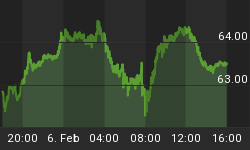Signs Of The Times:
"The banks that underwrote the $45 billion acquisition of TXU Corp, the world's biggest buyout, have offered to pay the $1 billion break fee in a desperate attempt to convince the private equity backers to drop their bid. It is understood that the banks asked Kohlberg Kravis Roberts and TPG to consider withdrawing their offer after the turmoil in the credit markets meant that the banks have little or no chance of syndicating the record-breaking $37 billion loan to investors. These banks include Goldman Sachs, Morgan Stanley, Citigroup, Lehman Brothers, and JP Morgan."
- The Times, September 1
"The U.S. Mortgage market is in 'turmoil' according to H&R Block Inc. Chief Investment Officer Mark Ernst . . . 'The loan originations market is in the midst of the most severe dislocation it has seen in years, maybe the most severe since the 1930s'."
- Bloomberg, August 29
This compares with our July 26 observation that this is likely the biggest train wreck in the history of the credit markets.
That the credit expansion has corrupted most everything is indicated in the following news clips, which also include mention of a reversal of opinion:
"The recent tidal wave of money into the art world has swept away its old ways of establishing an art work's aesthetic value. Collectors now buy works in public forums such as auctions, rather than in the privacy of galleries - it's conspicuous consumption."
- Wall Street Journal, January 29
"Art-Backed Loans Get Hung Up by Default Concerns"
The article noted that some of the art loans were set up like reverse mortgages such that the owners could receive monthly payments rather than selling and taking a capital-gains hit. However, recklessness may be abating as First Republic, one of the major players in the niche business of art lending, stated that they have "recently tightened in this area of our business".
Well, all of us may not be 'players' in the art market, but for those who enjoy wine there may be lower prices ahead.
"Investors Buy Wine to Drink in Profits"
"Funds Snap Up Cases of Prime Vintages to Sell at Tidy Prices"
The Wall Street Journal article of February 24 did not include which bank was aggressive in this form of niche lending, but it is reasonable to conclude that conspicuous consumption is often followed by even more conspicuous liquidation.
Porsches and Ferraris next?
Like civilizations, bull markets are born stoic and die epicurean.
Stock Market: As the saying goes, the increase in volatility is enough to gladden the heart of any manic-depressive.
Lowry's "90% days", both up and down, have been increasing in frequency, and then there is the growing number of "Hindenburg Omens", which is a sell signal based upon new highs and new lows. As Ross notes, there have been more "Hindenburgs" than stock market tops.
The point is that volatility arrived suddenly to the street and it is worth adding that it started with a salient change in the credit markets such that remarkable dislocation spread through most markets.
The first paragraph listed a couple of volatility indicators that are definitely saying that after a long interval the stock market is no longer a one-way street. The flight to real liquidity drove treasury bills from 4.94% to an extraordinary low of 2.45% in only two weeks. They haven't been much below 4.90% for over a year and as part of the rebound in stocks the bill rate has increased to 4.40%.
Dramatically increasing financial volatility with weaker trading volumes and A/Ds is something to be wary of.
However, September opened up with a pop and it will be interesting to see how far it carries. Going along with the move is confidence that the Fed will lower the Fed funds target. This is more of the irony we've been looking for. After complaining about rate hikes the street is celebrating the first rate cut, which seems imminent.
Early in August the initial liquidity concern was accomplished by declining treasury bill rates, which is the way these things work. The street is wrong in celebrating the Fed's genius to time cuts in administered rates. We will repeat it yet again. Short-dated market rates of interest turn down, the Fed follows and rates decline through most of the bear market.
The next irony could be similar to the complaints made at the end of 2000 when those who had celebrated policymaking blamed the last hike for "causing" the plunge in the stock market.
Until recently there have been two certainties. If you pitch your voice just right and say "kitty-kitty" often enough the cat will always come. The other one is that the Fed can always time interest rate changes to maintain the "Goldilocks" condition.
Nope - it looks like Lady Bountiful is joining forces with Mother Nature and we all know that she invented bear markets to correct the opinion of pundits.















